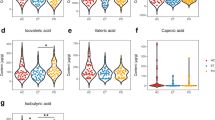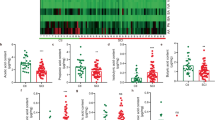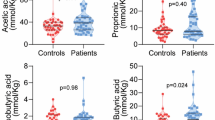Abstract
Study design
Cross-sectional explorative observational study.
Setting
The China Rehabilitation Research Center is one of the centers for spinal cord injury in China, and this study investigates the Chinese part of spinal cord injury.
Objective
To observe the changes of fecal short-chain fatty acids (SCFA) in patients with traumatic spinal cord injury (TSCI) compared with normal controls.
Methods
Thirty-eight patients with TSCI who were hospitalized in Beijing Boai Hospital of China Rehabilitation Research Center from April, 2017 to October, 2018 were recruited. Basic data such as age, gender, neurological level, etiology, and defecation method were recorded, and neurogenic bowel dysfunction score (NBD) was assessed. Twenty-one healthy subjects from the staffs of Beijing Bo’ai Hospital were recruited as the control group. Fresh stool samples were collected and gas chromatography–mass spectrometry (GC-MS) was used to determine the contents of caproic acid, isovaleric acid, isobutyric acid, valeric acid, butyric acid, propionic acid and acetic acid in feces of TSCI patients and controls. The Mann-Whitney U test was used to compare SCFA levels between the two groups.
Results
Compared with healthy controls, the levels of isovaleric acid and isobutyric acid in the feces of TSCI patients increased, while the levels of butyric acid and acetic acid decreased, and the differences were statistically significant (P < 0.05).
Conclusion
The fecal content of propionic acid and butyric acid decreased while that of isobutyric acid and isoamyl acid increased in patients with chronic TSCI.
This is a preview of subscription content, access via your institution
Access options
Subscribe to this journal
Receive 1 print issues and online access
We are sorry, but there is no personal subscription option available for your country.
Buy this article
- Purchase on SpringerLink
- Instant access to the full article PDF.
USD 39.95
Prices may be subject to local taxes which are calculated during checkout
Similar content being viewed by others
Data availability
The datasets used during the current study are available from the corresponding author upon reasonable request.
References
GBD 2016 Traumatic Brain Injury and Spinal Cord Injury Collaborators. Global, regional, and national burden of traumatic brain injury and spinal cord injury, 1990–2016: a systematic analysis for the global burden of disease study 2016. Lancet Neurol. 2019;18:56–87.
Mohammadi E, Villeneuve LM, Smith ZA. Spinal cord injury: the global incidence, prevalence, and disability from the global burden of disease study 2019. Spine. 2023;48:1767.
Hu S, Wang P, Dong Y, Li F. Incidence, prevalence and disability of spinal cord injury in China from 1990 to 2019: a systematic analysis of the global burden of disease study 2019. Eur Spine J. 2023;32:590–600.
Elmelund M, Klarskov N, Biering-Sørensen F. Fecal incontinence and neurogenic bowel dysfunction in women with traumatic and nontraumatic spinal cord injury. Dis Colon Rectum. 2019;62:1095–104.
Jing Y, Yu Y, Bai F, Wang L, Yang D, Zhang C, et al. Effect of fecal microbiota transplantation on neurological restoration in a spinal cord injury mouse model: involvement of brain-gut axis. Microbiome. 2021;9:59.
Jing Y, Yang D, Bai F, Wang Q, Zhang C, Yan Y, et al. Spinal cord injury-induced gut dysbiosis influences neurological recovery partly through short-chain fatty acids. NPJ Biofilms Microbiomes. 2023;9:99.
Liu P, Liu M, Xi D, Bai Y, Ma R, Mo Y, et al. Short-chain fatty acids ameliorate spinal cord injury recovery by regulating the balance of regulatory T cells and effector IL-17(+) γδ T cells. J Zhejiang Univ Sci B. 2023;24:312–25.
Zhang D, Jian YP, Zhang YN, Li Y, Gu LT, Sun HH, et al. Short-chain fatty acids in diseases. Cell Commun Signal. 2023;21:212.
He J, Zhang P, Shen L, Niu L, Tan Y, Chen L, et al. Short-chain fatty acids and their association with signalling pathways in inflammation, glucose and lipid metabolism. Int J Mol Sci. 2020;21:6356.
Yu B, Qiu H, Cheng S, Ye F, Li J, Chen S, et al. Profile of gut microbiota in patients with traumatic thoracic spinal cord injury and its clinical implications: a case-control study in a rehabilitation setting. Bioengineered. 2021;12:4489–99.
Kirshblum S, Snider B, Rupp R, Read MS. Updates of the international standards for neurologic classification of spinal cord injury: 2015 and 2019. Phys Med Rehabil Clin N Am. 2020;31:319–30.
van Doorn T, Groenendijk IM, Scheepe JR, Blok BFM. Neurogenic bowel dysfunction score in spinal cord-injured patients: translation and validation of the Dutch-language NBD score. Spinal Cord. 2022;60:223–7.
Pan Y, Liu B, Li R, Zhang Z, Lu L. Bowel dysfunction in spinal cord injury: current perspectives. Cell Biochem Biophys. 2014;69:385–8.
Pokusaeva K, Johnson C, Luk B, Uribe G, Fu Y, Oezguen N, et al. GABA-producing Bifidobacterium dentium modulates visceral sensitivity in the intestine. Neurogastroenterol Motil. 2017;29:e12904.
Strandwitz P. Neurotransmitter modulation by the gut microbiota. Brain Res. 2018;1693:128–33.
Oleskin AV, Shenderov BA. Probiotics and psychobiotics: the role of microbial neurochemicals. Probiotics Antimicrob Proteins. 2019;11:1071–85.
Panther EJ, Dodd W, Clark A, Lucke-Wold B. Gastrointestinal microbiome and neurologic injury. Biomedicines. 2022;10:500.
Friedland RP, Chapman MR. The role of microbial amyloid in neurodegeneration. PLoS Path. 2017;13:e1006654.
Kigerl KA, Hall JC, Wang L, Mo X, Yu Z, Popovich PG. Gut dysbiosis impairs recovery after spinal cord injury. J Exp Med. 2016;213:2603–20.
Zhang C, Zhang W, Zhang J, Jing Y, Yang M, Du L, et al. Gut microbiota dysbiosis in male patients with chronic traumatic complete spinal cord injury. J Transl Med. 2018;16:353.
Wang SZ, Yu YJ, Adeli K. Role of gut microbiota in neuroendocrine regulation of carbohydrate and lipid metabolism via the microbiota-gut-brain-liver axis. Microorganisms. 2020;8:527.
Hoving LR, Heijink M, van Harmelen V, van Dijk KW, Giera M. GC-MS analysis of short-chain fatty acids in feces, cecum content, and blood samples. Methods Mol Biol. 2018;1730:247–56.
Rodenhouse A, Talukder MAH, Lee JI, Govindappa PK, O’Brien M, Manto KM, et al. Altered gut microbiota composition with antibiotic treatment impairs functional recovery after traumatic peripheral nerve crush injury in mice: effects of probiotics with butyrate producing bacteria. BMC Res Notes. 2022;15:80.
Zheng Y, Zhou X, Wang C, Zhang J, Chang D, Zhuang S, et al. Effect of dendrobium mixture in alleviating diabetic cognitive impairment associated with regulating gut microbiota. Biomed Pharmacother. 2022;149:112891.
Li R, Liu R, Chen L, Wang G, Qin L, Yu Z, et al. Microbiota from exercise mice counteracts high-fat high-cholesterol diet-induced cognitive impairment in C57BL/6 mice. Oxid Med Cell Longev. 2023;2023:2766250.
Szczesniak O, Hestad KA, Hanssen JF, Rudi K. Isovaleric acid in stool correlates with human depression. Nutr Neurosci. 2016;19:279–83.
Naseribafrouei A, Hestad K, Avershina E, Sekelja M, Linløkken A, Wilson R, et al. Correlation between the human fecal microbiota and depression. Neurogastroenterol Motil. 2014;26:1155–62.
Gungor B, Adiguzel E, Gursel I, Yilmaz B, Gursel M. Intestinal microbiota in patients with spinal cord injury. PLoS One. 2016;11:e0145878.
Schmidt EKA, Torres-Espin A, Raposo PJF, Madsen KL, Kigerl KA, Popovich PG, et al. Fecal transplant prevents gut dysbiosis and anxiety-like behaviour after spinal cord injury in rats. PLoS One. 2020;15:e0226128.
Kigerl KA, Mostacada K, Popovich PG. Gut microbiota are disease-modifying factors after traumatic spinal cord injury. Neurotherapeutics. 2018;15:60–67.
Acknowledgements
The authors thank the Department of Spinal and Neural Functional Reconstruction, Beijing Bo’ai Hospital, China Rehabilitation Research Center, for their generous support. They are grateful to the Department of Emergency, Beijing Bo’ai Hospital, China Rehabilitation Research Center, for their help.
Funding
This study was supported by the Beijing Bo’ai Hospital.
Author information
Authors and Affiliations
Contributions
Dejian Zhang and Run Peng contributed equally to this work. Dejian Zhang conducted the search, collected and extracted the data, and wrote the manuscript. Run Peng extracted and analyzed the data, interpreted the results, and wrote the manuscript. Degang Yang extracted and analyzed the data.
Corresponding author
Ethics declarations
Competing interests
The authors declare no competing interests.
Ethical approval
This study was approved by the Beijing Bo’ai Hospital Clinical Trial Organization Ethics Committee. The protocol for this clinical trial is registered (registration no. ChiCTR-RPC-17010621) and is available in full at the Chinese Clinical Trial Registry (https://www.chictr.org.cn/). Informed consent was obtained from all participants. All methods were performed in accordance with the relevant guidelines and regulations.
Additional information
Publisher’s note Springer Nature remains neutral with regard to jurisdictional claims in published maps and institutional affiliations.
Rights and permissions
Springer Nature or its licensor (e.g. a society or other partner) holds exclusive rights to this article under a publishing agreement with the author(s) or other rightsholder(s); author self-archiving of the accepted manuscript version of this article is solely governed by the terms of such publishing agreement and applicable law.
About this article
Cite this article
Zhang, D., Peng, R. & Yang, D. A preliminary study on the changes of fecal short chain fatty acids in patients with traumatic spinal cord injury in the chronic phase. Spinal Cord Ser Cases 11, 3 (2025). https://doi.org/10.1038/s41394-025-00698-x
Received:
Revised:
Accepted:
Published:
Version of record:
DOI: https://doi.org/10.1038/s41394-025-00698-x



